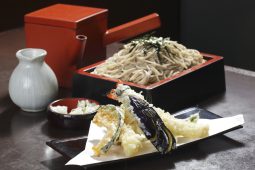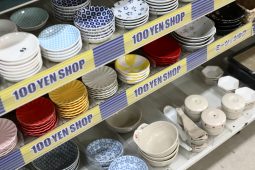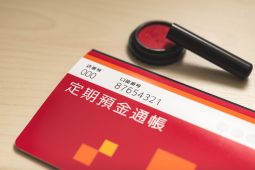Japan has a very high standard of customer service and most people find shopping in Japanese stores to be a very pleasant experience. Sales staff are generally extremely polite and helpful, and stores stock a great variety of high quality products.
In this article we will look at the main stores you will find in Japan and some common shopping customs
Department stores usually open between 10.00 and 20.00. Typically a department store will have a food market in its basement level, a dining area with various restaurants on its top floor, and several floors of fashion in between. Upper floors may also stock stationary, art products, crafts, and home interior products.
Supermarkets open from early morning till late evening and some are open 24 hours a day. They generally have a good range of reasonably priced food products available especially in the seafood section where the sheer variety is impressive. Supermarkets sometimes charge for plastic carrier bags, and sometimes give a small discount if you bring your own bag. Usually in the evening from around 18.00 onwards some prepared food products in the delicatessen section will be reduced in price, so this is a good time to pick up some cheap sushi or tempura for your supper.
Shōtengai are shopping arcades in downtown areas which are often roofed so that you can shop happily on rainy days. Here you will find a range of small and independent cafes, restaurants, second-hand clothing stores, and other shops offering diverse products and services.
Convenience stores, called konbini for short, are ubiquitous in Japan, and are handy for drinks, snacks and light meals. They also usually stock stationary, some household cleaning products, toiletries, batteries for electronic devices, and even shirts, socks, and underwear should you miss your train home and need a change of clothes. Convenience stores usually also have an ATM machine, and a photocopier, and are very often open 24 hours a day.
100 yen stores carry an incredible range of products all priced at 100 yen before tax. The big name stores you are likely to see are Daiso, Seria, and Can Do. These are good places to stock up on kitchenware, towels, bento boxes, stationary, cosmetics and toiletries.
Tax
Consumption tax is currently at 8% and is scheduled to rise to 10% in October 2019. Different stores will display prices in different ways, sometimes with the consumption tax included, and sometimes with the pre-tax price displayed more obviously. Useful expressions to look out for are 税抜き (zeinuki – “tax excluded”) and 税込 (zeikomi – tax “included”).
How to Pay
Big department stores accept major international bank cards such as VISA and Mastercard, but cash is still the main way to pay for goods in Japan. Recently prepaid IC cards are increasingly accepted as a method of payment at shops and restaurants, especially in areas close to railway stations. These rechargeable cards can also be used for public transportation which saves the time otherwise spent buying tickets. When you want to pay for something, you simply touch a card reader with your card and the payment is made. Different regions have different local IC cards such as Suica in Tokyo and Icoca in western Japan, but the major IC cards are all compatible with each other, so if you have one, you can use it across Japan.
Common Shopping Customs
Irasshaimase is a common greeting called out by sales staff as you enter a store and it simply means “welcome”. You do not need to respond to this greeting. Mata okoshi kudasaimase is another expression you will often hear when leaving a store, and this means “please come again”.
When you pay for something it is common to put your money onto a provided tray rather than directly into the cashier’s hand. Your change will be returned to you in the same way.
In Japan staff will assume you want a bag even for the smallest purchase. If you do not want a bag, you can say fukuro ha kekkō desu, which means “a bag is unnecessary”.
In stores you will often hear the tune of the Scottish folk song, Auld Lang Syne, played late in the day. In Japan this tune has a whole different set of lyrics and is called Hotaru no Hikari or “Glow of the Firefly”. When you hear this tune in a Japanese store it means the store is about to close and it is time for you to go home.








